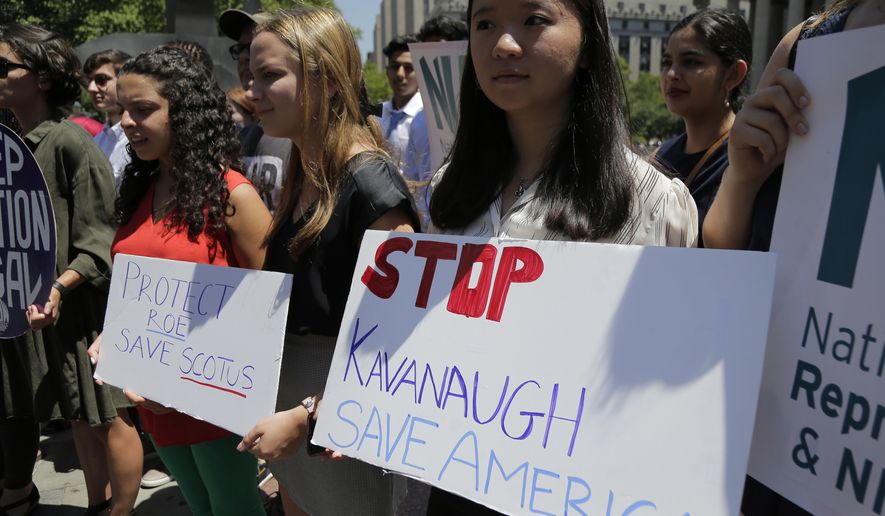Gun-rights activists are hoping they will have a sympathetic ear from President Trump’s new Supreme Court nominee, pointing to a 2011 dissent he wrote in a major gun case arguing a ban on semiautomatic rifles was unconstitutional.
Judge Brett M. Kavanaugh wrote that semiautomatic rifles were in “common use” by Americans for many purposes and the ban enacted by the city of Washington, D.C., went too far.
Senate Democrats on Tuesday said they fear he would close the door to efforts to expand gun control efforts in the wake of recent school shootings.
“Here is a memo to the Parkland students: If you care about common sense gun violence protection, Judge Kavanaugh is your worst nightmare,” said Sen. Richard Blumenthal, Connecticut Democrat, referring to the Florida high school where a gunman killed 17 students and teachers and wounded 17 more.
The 2011 case, known in legal circles as “Heller II,” is just one of the judge’s rulings that will get scrutiny as the Senate begins to look over Judge Kavanaugh’s record.
In Heller II, a resident of the District of Columbia had challenged the city’s ban on a broad array of firearms, as well as a number of other gun regulations. The U.S. Circuit Court of Appeals for D.C. issued a complicated 2-1 ruling that overturned some of the regulations but upheld the ban on some guns.
Judge Kavanaugh, in dissent, said he would have struck down the ban.
“There is no meaningful or persuasive constitutional distinction between semi-automatic handguns and semi-automatic rifles,” the judge wrote, noting handguns have been found lawful.
California Sen. Dianne Feinstein, the top Democrat on the Judiciary Committee, said the ruling was a departure from the prevailing legal consensus.
“Even though five circuit courts have upheld bans against assault weapons, [Judge Kavanaugh] argued in 2011 against Washington D.C.’s ban because weapons like AR-15’s are in ’common use,’” Ms. Feinstein told reporters Tuesday.
While that gun decision didn’t make it to the Supreme Court, a number of other cases Judge Kavanaugh was involved in did. President Trump, in announcing the nomination Monday, said the high court adopted Judge Kavanaugh’s reasoning more than a dozen times.
Among those is an Obamacare case where opponents challenged the 2010 health law, arguing it was an overreach of government power. The court ruled 2-1 in favor of the law, upholding the “individual mandate” as valid in a case known as Seven-Sky v. Holder.
Judge Kavanaugh argued the court didn’t have the ability to hear the case at that point, ruling the individual mandate was a penalty for not purchasing health care, which could be constituted as a tax.
One year later, a divided Supreme Court ended up ruling in favor of the individual mandate, with Chief Justice John G. Roberts Jr. explicitly citing Congress’s taxing power in his opinion.
Many conservatives said Judge Kavanaugh’s dissent blazed the path the high court used to uphold the Affordable Care Act.
Democrats, though, now insist Judge Kavanaugh would strike down Obamacare should the chance arise.
“He’s no neutral arbiter, he’s already made up his mind,” said Senate Minority Leader Charles E. Schumer, New York Democrat.
On the right, some conservatives worry about Judge Kavanaugh’s support for the National Security Agency in 2015, when he joined other judges in refusing to overturn a ruling upholding warrantless collection of massive amounts of “metadata” collected from domestic phone call patterns.
The NSA started the bulk collection in 2001 after the terrorist attacks on Sept. 11.
“The government’s collection of telephony metadata from a third party such as a telecommunications service provider is not considered a search under the Fourth Amendment,” Judge Kavanaugh wrote in an opinion in the case, Klayman v. Obama.
“Even if the bulk collection of telephony metadata constitutes a search, [] the Fourth Amendment does not bar all searches and seizures. It bars only unreasonable searches and seizures. And the government’s metadata collection program readily qualifies as reasonable,” he added.
Corynne McSherry, legal director at the Electronic Frontier Foundation, said Judge Kavanaugh’s past rulings concern her organization.
“We hope the Senate will press him to articulate his views on these crucial issues,” she said.
• Alex Swoyer can be reached at aswoyer@washingtontimes.com.




Please read our comment policy before commenting.